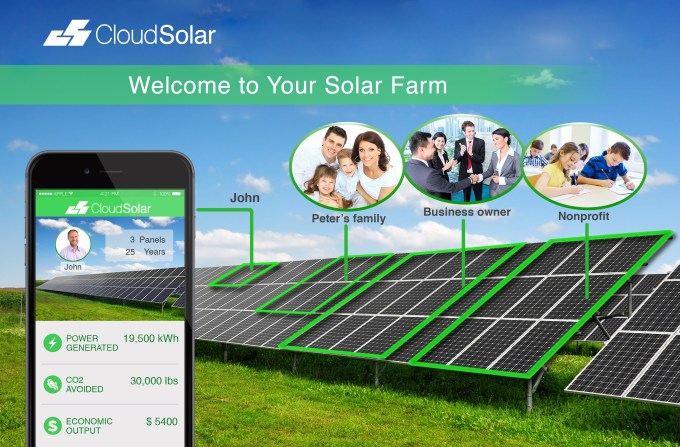Solar panels are becoming increasingly affordable, but many people still face barriers to harnessing the power of the sun for their own homes. For example, they might live in an apartment or in a house where the roof is angled or structured improperly for solar panel installation.
A new Boston-based startup called CloudSolar is offering an intriguing solution. Founded by a team including two electrical engineering Ph.D. candidates and currently raising funds on Indiegogo, CloudSolar lets people buy a solar panel, or a share in one, on a farm that is expected to be completed by 2016 (erecting the solar panels will only take a couple of months, but the company also has to deal with utility and land permits, which will take longer).
Once the farm is up and operating, electricity generated by the solar panels will be sold to local utilities. Solar panel owners are promised 80 percent of the total proceeds created by the panels over the next 25 years, and help with applying for whatever tax credits they are eligible for. They can monitor how much energy their panel is producing, and how much carbon dioxide emissions it is estimated to offset, through an app.
The idea is similar to community solar gardens, which provide power to local subscribers, but is not limited to people within a specific area. Though the first CloudSolar farm will be built in New England (the company won’t disclose the exact location yet, citing competition), people from around the world have participated in its Indiegogo campaign, which has raised about $280,000 of its $300,000 flexible funding goal with eight days left to go. A full panel costs $750, but contributors can also purchase a quarter share in a panel for $250.
Making it easier to participate in the renewable energy movement

Contributors hail from across the U.S., as well as countries including Australia, Canada, France, Italy, and England, which makes CloudSolar’s team hopeful that they will be able to scale their business model relatively quickly.
Founders Michael Sun, Cory Absi, and Xiaohang Li came up with the idea behind CloudSolar after looking around Boston and noticing the lack of solar panels on rooftops. This was especially striking to Sun, whose PhD research at Boston University focuses on solar cell and LED efficiency.
“Cory installed solar panels and his neighbors kept coming to him and asking him how to get them so they could save on their energy bills,” says Sun. “But they talked to developers and were told that their roofs needed to be reinforced for solar panels or were not properly angled.”
“We thought there should be a better way. Why not help them go solar by putting their panels in a remote area. So we borrowed ideas from cloud computing, and combined it with the Internet of Things and traditional solar energy.”
CloudSolar’s target consumers are people who are frustrated by their inability to install solar panels on their own homes, but still want to feel like they are contributing to the renewable energy movement.
“When we talk to our contributors, most of them are environmentally conscious people who are also interested in perhaps getting a decent economic return from their contribution,” says Sun. He adds a substantial amount of contributions have come from non-profits that have purchased solar panels on behalf of their organization or its members, as well as idealistic parents who are giving the solar panels as gifts to their very young children.
Tackling the challenge of scaling up around the world
To be sure, there are several potential drawbacks to the project. For one thing, the financial returns from CloudSolar panels are probably not enough to offset the cost of running a home using traditional energy. It’s also difficult to say with certainty if the power generated by a remote solar panel is enough to make up for the amount of carbon emissions its owner creates.
As with any startup, there is also the risk of CloudSolar folding. In that case, the company would ship solar panels directly to their owners. The CloudSolar farm will also be fully insured against natural disasters, like snowstorms, and theft.
Sun is optimistic, however, that CloudSolar’s business model will work, in part because of renewable energy targets set by governments around the world. For example, in the U.S., government agencies, the largest energy consumers in the country, are expected to derive 20 percent of their total electricity used from renewable sources by 2020.
CloudSolar is in discussions with several utility companies and local developers to buy the energy generated by its farm, but can’t disclose which ones until after the Indiegogo campaign is finished. If the money raised from the Indiegogo campaign is not enough to fully finance the project, CloudSolar will also pursue capital from angel investors, venture capital firms, or take out private loans.
Sun hopes eventually to bring CloudSolar’s business model to other countries including his native China, where air pollution is notoriously awful.
“I’m very passionate about clean energy. Air pollution is a huge problem in China,” says Sun, who grew up in Ningbo. “I want to prove the concept and pursue the dream here in the U.S. If it proves to scalable, I can carry on the project there.”
